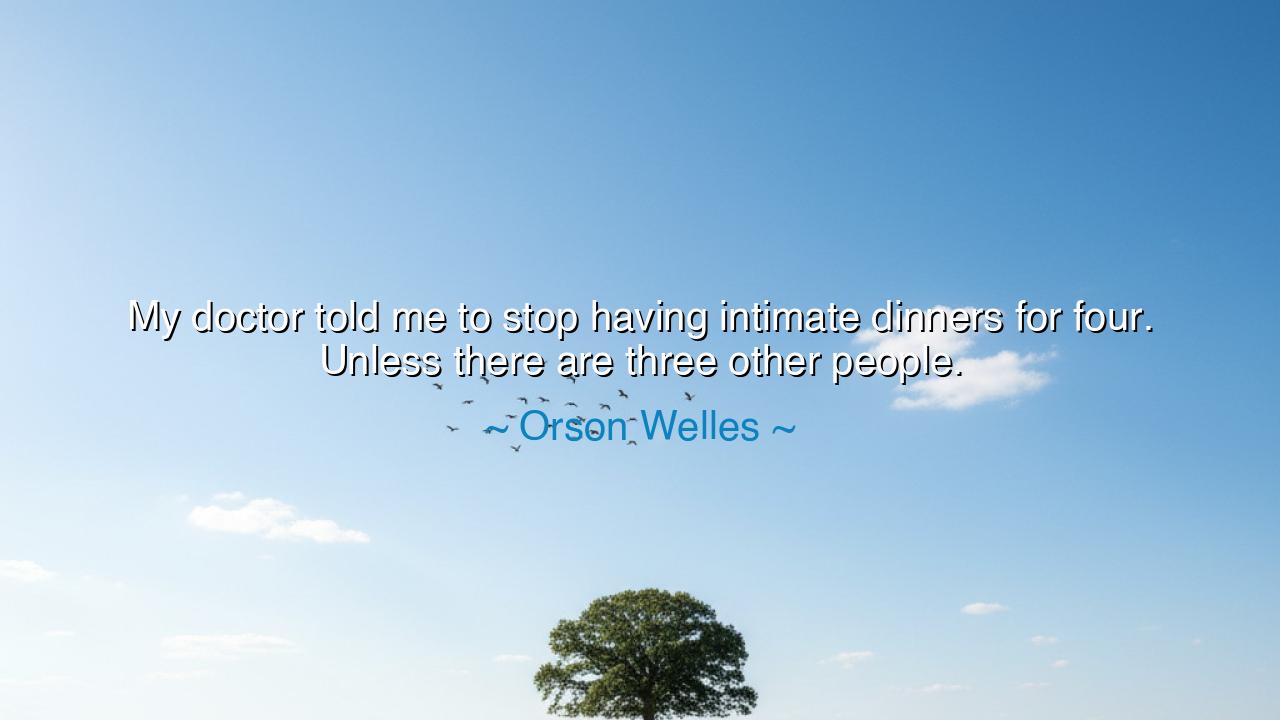
My doctor told me to stop having intimate dinners for four.
My doctor told me to stop having intimate dinners for four. Unless there are three other people.






When Orson Welles, the great dramatist and visionary of cinema, declared, “My doctor told me to stop having intimate dinners for four. Unless there are three other people,” he spoke in jest — yet within his humor lies a mirror reflecting a deeper truth about desire, indulgence, and restraint. Welles, known for his grand appetites both artistic and physical, wielded wit as his sword. But like all true humor, his words carry the weight of wisdom. They reveal the eternal struggle between pleasure and moderation, between the feast that nourishes and the excess that enslaves.
To understand his meaning, one must see the joke as more than a jest about food. In truth, Welles was speaking to the human tendency toward self-indulgence — that eternal hunger that exists in every heart. His “intimate dinner for four” with only one person at the table paints the image of gluttony disguised as sophistication, of the soul that seeks comfort in excess. And yet, through laughter, he admits a universal truth: that discipline, though difficult, is the companion of health, while indulgence, though tempting, is the gateway to decline. It is the eternal lesson taught by philosophers, priests, and poets alike — that the body is the servant of the will, and the will must remain awake.
Welles himself embodied the paradox of the artist — capable of great genius and great appetite. His life was one of creation and consumption, of brilliance matched with abandon. He gave the world Citizen Kane, a monument to human ambition, but also lived in a world of grand banquets, deep wine, and restless hunger. Thus his quote emerges not from moral preaching but from self-awareness — the confession of a man who knows his flaws and meets them with humor. Like the ancient satirists of Rome, who mocked their own vices while teaching virtue, Welles uses wit to warn us: laughter can be a form of truth-telling sharper than rebuke.
In the days of the ancients, such a reflection might have been uttered by Socrates or Epicurus, both of whom spoke of pleasure not as sin, but as something to be governed with wisdom. Epicurus taught that pleasure must be measured, for the greatest delight lies not in abundance but in sufficiency. Socrates, when offered rich banquets, reminded his students that contentment is wealth greater than gold. Welles’s quip, though wrapped in modern humor, echoes this same wisdom — that one must enjoy the feast of life without becoming devoured by it.
Consider, too, the story of Lucullus, the Roman general whose dinners became legend. At first, his banquets were shared in victory, filled with celebration and gratitude. But over time, the feasts grew lavish, and he dined in solitude, surrounded by dishes meant for kings. When a friend asked why he needed such splendor when dining alone, Lucullus replied, “Tonight, Lucullus dines with Lucullus.” In that moment, his indulgence revealed its emptiness. Like Welles’s solitary dinner “for four,” it was not hunger of the body that drove him, but hunger of the spirit — a longing for fulfillment in the wrong place.
Through laughter, Orson Welles delivers the same eternal lesson: to live well is to know when to stop. The body is a loyal servant but a dangerous master. To indulge without awareness is to lose the joy of moderation; to restrain without joy is to lose the purpose of life. The wise soul finds the balance — savoring the sweetness of the feast without mistaking it for salvation. Welles, ever the storyteller, shows us that humor can carry the same message as philosophy: that laughter is not the denial of truth, but its gentlest form of delivery.
Therefore, let this quote be more than a jest; let it be a reminder. Pleasure, like fire, is a noble servant but a cruel master. Feast when you can, but share your table. Taste life’s abundance, but know its limits. Laugh at your excesses, as Welles did, for in that laughter lies humility — the first step toward wisdom. And when next you sit to dine, remember: even a meal for one may be a banquet for four, if the heart forgets the virtue of restraint.






AAdministratorAdministrator
Welcome, honored guests. Please leave a comment, we will respond soon